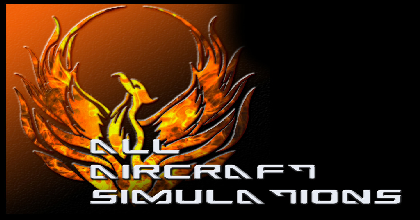25.06.2009, 08:13
You should have a good amount of altitude under you before attempting this maneuver. At least 4000M, but more is better.
Sometimes you are high up like that, and you come across another pilot with much more altitude.
The thing i've learned to do is keep my speed (TAS) above 600Kph, so if i have to drop a bit of altitude to do so i will, and level out at 600kph.
The attacker will still circle above you to line up his pass.
You can continue to circle under him so he is forced to make a steeper dive, or he will most likely continue to circle, but up high like that its best to save your speed and not turn unless you are in danger of attack.
If he makes his pass correctly he would prefer to get some separation and go into a shallow dive and attack from angles that aren't forcing him to dive steeper than 30 degrees.
If he pounces on you from above or from a much shallower angle, try to go into a shallow dive before he is closer than 3km to get your speed up and reduce his closure rate.
(see below)
![[Image: il2fb2009-06-2505-10-37-14.jpg]](http://i145.photobucket.com/albums/r201/spre77/il2fb2009-06-2505-10-37-14.jpg)
You will see the distance meeter. When he gets to 1km.... you will chop throttle and extend combat flaps, and bank hard and turn.
![[Image: il2fb2009-06-2505-11-03-49.jpg]](http://i145.photobucket.com/albums/r201/spre77/il2fb2009-06-2505-11-03-49.jpg)
You should be versed in when you black out, because you need to be effective at riding that edge to be a good pilot. You will be able to turn sharper with out blacking out provided you chopped throttle. Combat flaps will aid in slowing you down and help you turn with out stalling.
![[Image: il2fb2009-06-2505-11-29-30.jpg]](http://i145.photobucket.com/albums/r201/spre77/il2fb2009-06-2505-11-29-30.jpg)
If he is diving on you or coming at you from a higher angle, you can pull upward in the middle of the turn and level out or even point the nose up slightly to slow down more.
You will see him trying to bank with you, and if he does he will black out, and if he doesn't he will shoot by on the outside of your turn.
![[Image: il2fb2009-06-2505-11-36-57.jpg]](http://i145.photobucket.com/albums/r201/spre77/il2fb2009-06-2505-11-36-57.jpg)
If you time it right, or anticipate when he has broken off his attack, you can roll back, pouring on the throttle and catch him as he extends.
![[Image: il2fb2009-06-2505-12-05-04.jpg]](http://i145.photobucket.com/albums/r201/spre77/il2fb2009-06-2505-12-05-04.jpg)
You would only have a 2 or 3 second snap shot, so your ability to get him in your site will depend on how you practice.
![[Image: il2fb2009-06-2506-04-33-61.jpg]](http://i145.photobucket.com/albums/r201/spre77/il2fb2009-06-2506-04-33-61.jpg)
Please keep in mind the technique is for ideal circumstances, but you will be able to use it as part of vocabulary of moves and maneuvers.
Sometimes you are high up like that, and you come across another pilot with much more altitude.
The thing i've learned to do is keep my speed (TAS) above 600Kph, so if i have to drop a bit of altitude to do so i will, and level out at 600kph.
The attacker will still circle above you to line up his pass.
You can continue to circle under him so he is forced to make a steeper dive, or he will most likely continue to circle, but up high like that its best to save your speed and not turn unless you are in danger of attack.
If he makes his pass correctly he would prefer to get some separation and go into a shallow dive and attack from angles that aren't forcing him to dive steeper than 30 degrees.
If he pounces on you from above or from a much shallower angle, try to go into a shallow dive before he is closer than 3km to get your speed up and reduce his closure rate.
(see below)
![[Image: il2fb2009-06-2505-10-37-14.jpg]](http://i145.photobucket.com/albums/r201/spre77/il2fb2009-06-2505-10-37-14.jpg)
You will see the distance meeter. When he gets to 1km.... you will chop throttle and extend combat flaps, and bank hard and turn.
![[Image: il2fb2009-06-2505-11-03-49.jpg]](http://i145.photobucket.com/albums/r201/spre77/il2fb2009-06-2505-11-03-49.jpg)
You should be versed in when you black out, because you need to be effective at riding that edge to be a good pilot. You will be able to turn sharper with out blacking out provided you chopped throttle. Combat flaps will aid in slowing you down and help you turn with out stalling.
![[Image: il2fb2009-06-2505-11-29-30.jpg]](http://i145.photobucket.com/albums/r201/spre77/il2fb2009-06-2505-11-29-30.jpg)
If he is diving on you or coming at you from a higher angle, you can pull upward in the middle of the turn and level out or even point the nose up slightly to slow down more.
You will see him trying to bank with you, and if he does he will black out, and if he doesn't he will shoot by on the outside of your turn.
![[Image: il2fb2009-06-2505-11-36-57.jpg]](http://i145.photobucket.com/albums/r201/spre77/il2fb2009-06-2505-11-36-57.jpg)
If you time it right, or anticipate when he has broken off his attack, you can roll back, pouring on the throttle and catch him as he extends.
![[Image: il2fb2009-06-2505-12-05-04.jpg]](http://i145.photobucket.com/albums/r201/spre77/il2fb2009-06-2505-12-05-04.jpg)
You would only have a 2 or 3 second snap shot, so your ability to get him in your site will depend on how you practice.
![[Image: il2fb2009-06-2506-04-33-61.jpg]](http://i145.photobucket.com/albums/r201/spre77/il2fb2009-06-2506-04-33-61.jpg)
Please keep in mind the technique is for ideal circumstances, but you will be able to use it as part of vocabulary of moves and maneuvers.

 but nice utopia though.
but nice utopia though.

![[Image: 29p95pf.gif]](http://i47.tinypic.com/29p95pf.gif)
